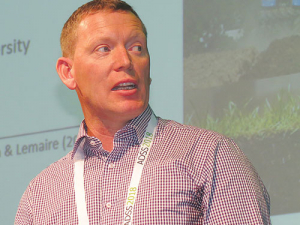An Irish farm systems researcher says any solutions that scientists come up with to solve problems must be simple and not create other problems.
Dr Brendan Horan, from Teagasc, the Irish agricultural research organisation at Moorepark, County Cork, says the challenge for dairy and other farmers today is to produce high-quality products in a sustainable way. This must take account of environmental and animal welfare issues to produce better quality products for consumers but still retain farm profitability.
“The key is finding simple solutions because farms are big and complicated businesses to run and you can’t have solutions that solve one problem but create another. So it has to solve a problem but still be totally integrated within the production systems.
“Farmers are very responsive to changes on their farms but sometimes science supports changes that don’t work within farmers’ existing systems. So it’s up to scientists to create solutions that are easy to adopt.”
Horan says Irish and New Zealand farmers are aware of the challenges they face and are hungry for solutions; their problems are similar given that both run grass-based systems. He sees a lot of scope for the two countries to work together to develop solutions that will deliver better returns to pastoral farmers.
“As a regular visitor to NZ over many years I have learned a lot from farmers and researchers. It’s a place I look to. The excellent research in NZ and Ireland needs integrating and packaging so as to solve problems for farmers.”
Getting messages about change to ‘hard-to-reach’ farmers is no easy task and it requires multiple communication channels, Horan says. “Farmers are the curators of land. I have never met a farmer who didn’t want to improve the environmental footprint of their systems. It requires a better flow of information from customers right through the supply chain back to farmers. If you look, for example, at Europe, lots of industries there have gone down the road of more cultivation systems to avoid some of the negatives of grasslands. Invariably they found that by trying to solve one problem they have discovered many others.”
Horan says grassland provides much benefit via biodiversity, nutrient management and carbon sequestration. Farmers must ‘harvest’ those benefits and try to improve the management systems on those grasslands.
“Consumers are now looking to products produced from grass-fed animals and they can see the health benefits they offer. A whole benefit area there will benefit farmers in the long term and we have to create value from grass-based industries.”
Horan says because grass-fed products are nutritionally better for consumers, it’s important that such products command a premium in the market that will translate into better returns to farmers.
Profitability and sustainability require equal emphasis, he says.
“The good thing for grazing systems -- be it Ireland or NZ -- is that you can have win-wins. You can have things that improve the profitability of dairy farms and are also beneficial in environmental footprints, improving the genetic merit of our animals, incorporating legumes in swards and better management practices. We can achieve these gains while improving farm profitability and that provides great opportunities for farmers,” he says.

















